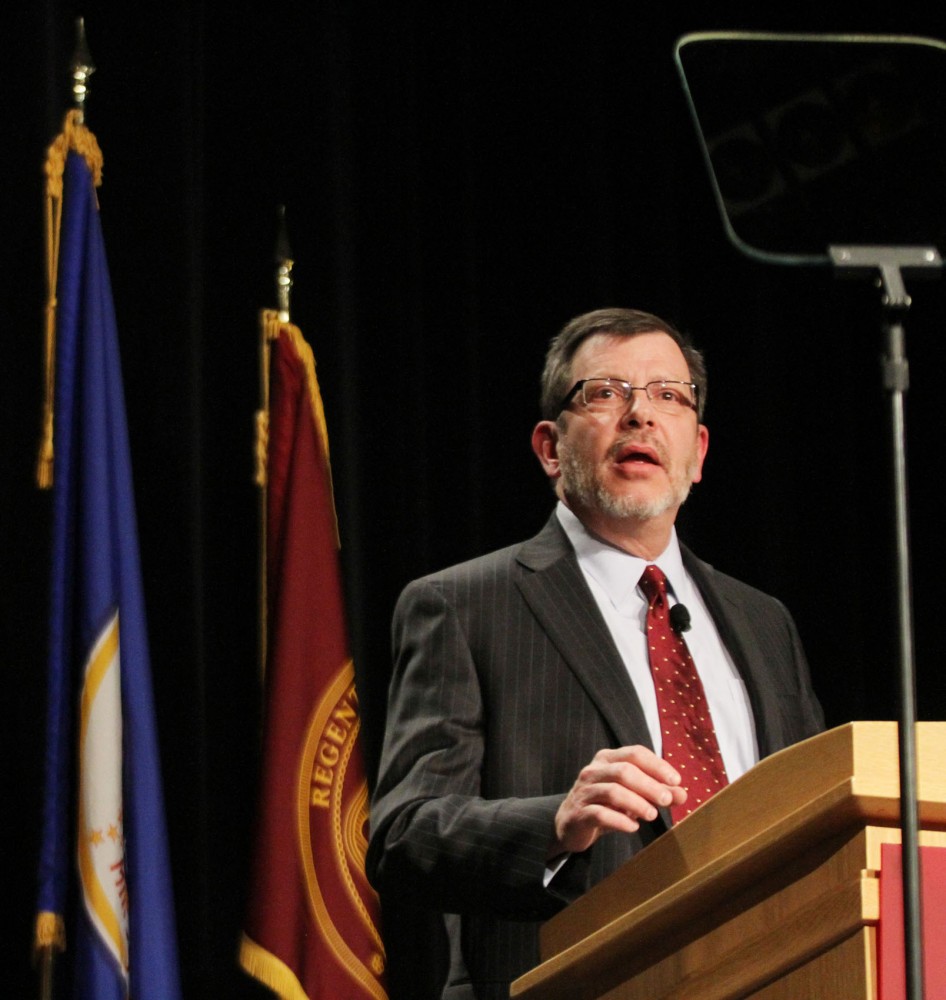In his first State of the University address Thursday, President Eric Kaler suggested taking “a serious and rigorous look” at moving to a year-round academic calendar, with three 14- or 15-week periods.
The proposal was met with mixed reactions from students and faculty. But Kaler said the benefits would outweigh the costs.
The altered calendar would make it easier for students to graduate in less than four years, Kaler said.
This calendar would work around the religious holidays in December and the 10-day Minnesota State Fair. He also suggested that it would include an extended winter session in January.
Students would be able to earn 120 credits in less than three years and study abroad in a longer winter session or work under a new calendar, Kaler said.
Although junior Joey Senkyr would still choose to take the summer off to complete an engineering internship, which is important to his major, he said he would be in favor of a calendar change.
He said freshman engineering majors could study for all three semesters the first year and then maybe take one summer off to do an internship.
“That would be more flexible,” Senkyr said.
A new academic calendar would allow for more laboratory and classroom space by reducing bottleneck issues. Having three semesters would also increase tuition revenue dollars to the University to hire more faculty, Kaler said.
Faculty would still teach two semesters a year but could have two consecutive semesters dedicated to research.
Alternatively, faculty could decide to work nine months in a year and teach three semesters from time to time for additional compensation.
The logistics of a year-round calendar might be problematic, said Caroline Hayes, a mechanical engineering professor.
She said faculty levels in her department are already strained and a year-round academic calendar would require hiring more faculty members and teaching assistants.
“I’m not sure how that would work,” Hayes said.
She also said students working through college might have problems if they no longer have the summer to make money.
Kaler acknowledged challenges with a new calendar, such as financial aid.
“I think the benefits could outweigh the challenges, and this is an idea well worth moving forward,” Kaler said.
Undergraduate student Hannah Smiltneek said she was surprised by the possible change.
If it was mandatory for students to do a three-semester year, Smiltneek said she wouldn’t have wanted to come to the University.
She also said that it would be harder to get to know faculty if students graduated in just three years.
Joseph Konstan, a professor of computer science, said the change would be a good idea if students were encouraged to take their time for different experiences like research or work.
But the change might be an issue if it was used to simply push students to finish school quickly, he said.
Though he hadn’t heard of the proposal, Tom Mortenson, a senior scholar at the Pell Institute for the Study of Opportunity in Higher Education, said the concept is interesting.
“I suspect it’s a long overdue proposal since the origin of the nine-month academic calendar was agrarian,” Mortenson said. A nine-month academic calendar has its origins in allowing the summer time for college students to return home and help out on the farm.
A group made up of University faculty looked into a year-round calendar last year and concluded that the idea needs closer examination, Kaler said.
He said George Washington University and Purdue University are looking at similar proposals.
The University of Minnesota administration will be looking at the Twin Cities campus first before having any potential conversations with other campuses, Kaler said.
– Jill Jensen contribued to this report.









